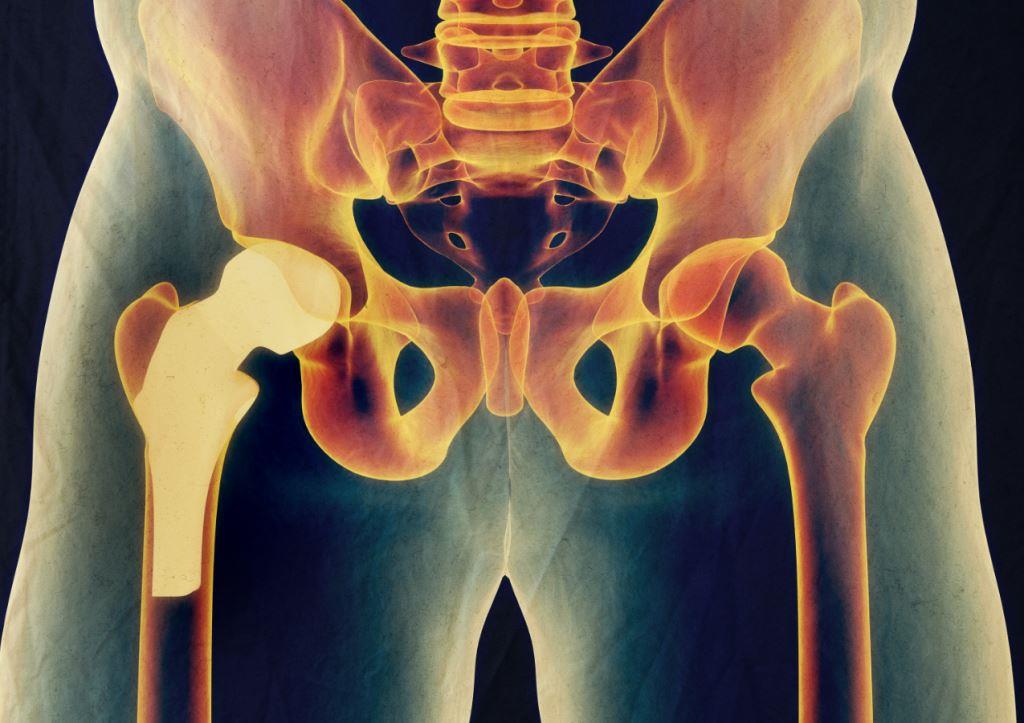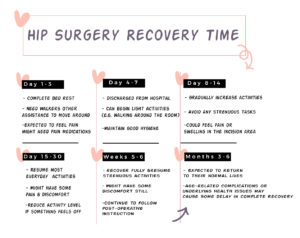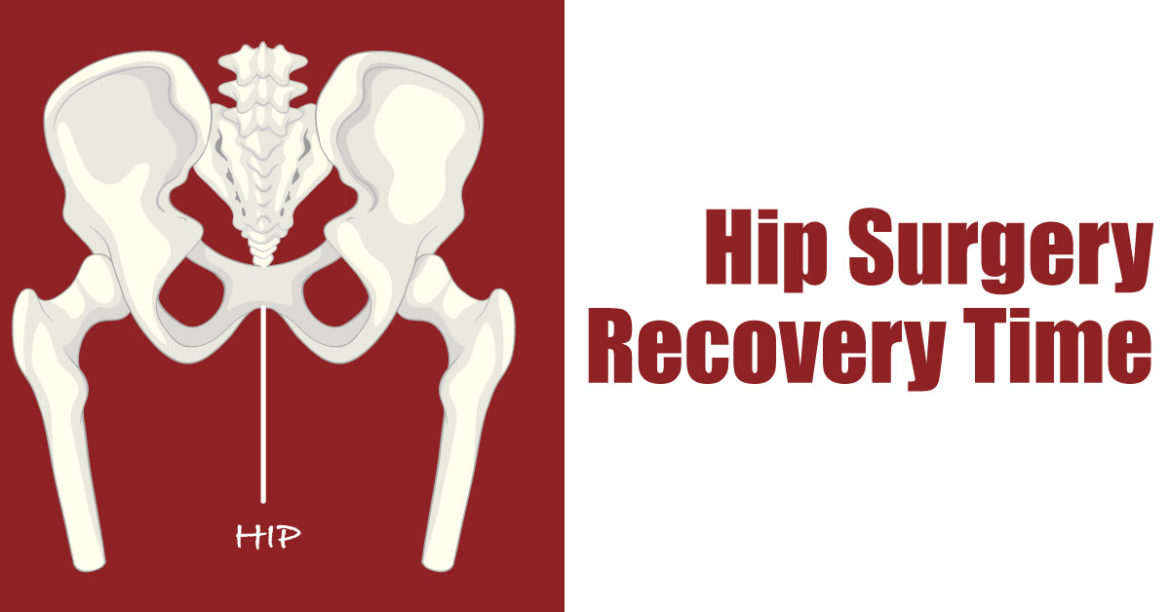Did you know that every year, over 450,000 hip replacements are performed in the USA? In addition, The American Joint Replacement Registry (AJRR) reports that the median age for individuals undergoing hip surgery is 67 years. The data may seem intimidating but don’t forget that many people live full, active lives after surgery.
If you or a senior loved one is struggling with severe joint pain around the hip area and considering surgery, it’s crucial to understand the procedure and the recovery process. You may be wondering how long the recovery will take or how you can help your loved one during this time. This article will discuss everything you need to know about hip surgery recovery time for the elderly, as well as some tips to help make the process easier. So, keep reading!
What Is Hip Surgery?
Hip surgery is a type of operation that involves repairing or replacing the hip joint. The hip joint is a ball & socket joint that enables the leg to move in different directions. Over time, the cartilage that cushions the hip joint can wear down, causing pain and stiffness. This wear and tear can result from arthritis or other related conditions.
The most common type of hip surgery is hip replacement, also called hip arthroplasty. This procedure involves replacing the damaged hip joint with an artificial joint. Hip surgery can also be done to repair a damaged hip joint, which is called hip resurfacing. It is a less invasive procedure in which only the damaged surface of the ball portion of the joint is removed and replaced.

Hip surgery recovery time for elderly
Why Does One Need a Hip Surgery?
A hip surgery is typically needed when the joint becomes severely damaged and causes pain and immobility. It is often performed when other treatments, such as physical therapy, pain medications, and walking aids, have not provided enough relief from hip pain. Hip surgery may also be recommended if you have a hip fracture or are suffering from avascular necrosis (a condition in which the blood supply to the bone is interrupted, causing the bone to die).
Some of the conditions that may require surgery include:
1. Hip dysplasia
Hip dysplasia is a condition that can cause the hip joint to not develop properly. If left untreated, hip dysplasia may cause the ball-and-socket of the hip joint to wear down, leading to pain, stiffness, arthritis, and, ultimately surgery.
2. Osteoarthritis
Osteoarthritis is one of the most common causes of hip replacement surgery. It causes the cartilage in our joints to wear down leading to extreme pain and discomfort. In some cases, the pain may be so severe that it makes it difficult for a person to perform activities of daily living.
3. Rheumatoid arthritis
Rheumatoid arthritis is an autoimmune disease that leads to inflammation and pain in the joints, including the hips. In severe cases, rheumatoid arthritis may destroy the hip joint, which may require surgery to replace it.
Reasons Why Hip Surgery Patients Need Time for Recovery
It is important for patients to understand that hip surgery recovery takes time. While it might seem frustrating, it is necessary to allow the surgical site to heal properly and prevent complications. Here are some reasons why hip surgery patients need time for recovery.
1. To allow the incision site to heal properly
The incision made during hip surgery needs time to heal properly. If patients put too much strain on the area too soon, they may cause the wound to open or become infected. To reduce this risk, patients need to take antibiotics and practice good hygiene during recovery.
2. To allow the surrounding muscles to recover
The surgery weakens the muscles and bones around the hip joint. Therefore, patients need time to regain their muscles before they put too much stress on the joint. Additionally, patients might need physical therapy to help them regain their strength and range of motion.
3. To prevent blood clots
Blood clots can be a serious complication following any surgery. To minimize the risk of forming blood clots, patients are typically advised to walk as soon as they can after surgery. However, this is not recommended following hip surgery due to the risk of dislodging the newly implanted hip joint. Walking too soon after surgery can also lead to other complications, such as bleeding or infection.
4. To avoid falls
Falls are a common hazard for older adults, and those who have recently had hip surgery are particularly at risk. This is because the recovery process can make patients unsteady on their feet. To prevent falls and other accidents, it is important for patients to take things slowly after surgery and use assistive devices when necessary.
5. To avoid future complications
Hip surgery comes with a risk of complications, such as blood clots, pneumonia and heart problems. To reduce these risks, patients need to follow their doctor’s instructions for post-operative care, such as taking their medications and getting enough rest.
How much does a hip surgery cost?
Hip surgery cost, specifically hip replacement surgery, can fluctuate drastically based on factors such as the specific procedure performed, the location of the surgery, the surgeon’s experience, the hospital or surgical center chosen, the type of anesthesia used, and any additional treatments or services required.
In the United States, the average hip replacement surgery cost can range from $30,000 to $45,000, including the expenses associated with the surgeon, anesthesia, hospital stay, and post-operative care. However, according to the World Population Review, the median hip replacement cost in 2024 stands at $40,364.
These estimates often do not include additional costs such as pre-operative tests, physical therapy, medications, or follow-up appointments.
It is important to note that these figures are just average estimates and can differ significantly based on individual circumstances. Factors such as the patient’s insurance coverage, the need for specialized implants, and any complications during or after the surgery can also impact the overall hip replacement cost.
To obtain a more accurate estimate of the cost of hip surgery, it is advisable to consult with a healthcare provider or contact the relevant hospital or surgical center directly.
What Does the Hip Surgery Recovery Time Look Like for the Elderly?
The recovery process after hip surgery will vary depending on the type of surgery. For example, a hip replacement usually requires a longer recovery than a hip repair. One may need six months to a year to fully recover from hip surgery. Here’s the full timetable for hip surgery recovery for the elderly:
Day 1-3
You will likely be instructed to rest and keep your leg in an elevated position. You may also be given assistive devices like crutches or walkers to help you get around. Since you are expected to feel severe pain post-surgery, some pain medications might be given to subside it.
Day 4-7
If everything is under control, you will probably be discharged from the hospital and can begin light activities, such as walking around the house or room. Make sure to take it easy and avoid putting too much stress on your hip. It is also crucial to maintain good hygiene and keep the surgical area
Day 8-14
You can gradually increase your activity level, but continue avoiding strenuous exercises. At this time, you may continue to experience pain or swelling in the incision area as the wound is still tender. Also, by this time, your stitches should dissolve but if not, consider getting them removed.
Day 15-30
You can resume most of your everyday activities, but make sure to take it easy and listen to your body. If you experience any pain or discomfort, reduce your activity level until the pain subsides and consult with your doctor.
Weeks 5-6
You are expected to fully recover and resume strenuous activities in six weeks. However, you are still likely to have some pain and discomfort. Be sure to continue to follow your doctor’s post-operative instructions carefully.
Months 3-6
Most patients are expected to return to their normal lives after three to six months post-surgery. However, some elderly patients may take longer to make a full recovery due to age-related complications or underlying health issues such as diabetes or arthritis.

Hip Surgery Recovery Timeline
Recovery After Hip Replacement Surgery for the Elderly
Hip replacement surgery is a surgical procedure that involves replacing the damaged hip joint with an artificial one. Recovery after hip replacement surgery can be lengthy, especially for older patients. However, most people are expected to fully recover within three months. Patients might need to undergo physical therapy to regain strength in the hip joint.
Some tips for a successful recovery after hip replacement surgery include:
- Following the surgeon’s instructions and attending all follow-up appointments
- Taking it easy and resting as much as possible
- Doing physical therapy exercises under the guidance of a therapist
- Taking pain medication as needed
- Eating a healthy and balanced diet
- Increasing activity levels gradually
- Avoiding high-impact activities, such as running or jumping
Final Thoughts
Elderly patients who have undergone hip surgery can expect a long and challenging road to recovery. However, most patients fully recover within six weeks to three months, except for some unusual cases Though the recovery time varies from individual to individual, some general tips can help make the process smoother and quicker. Following your doctor’s orders, getting plenty of rest, and taking physical therapy sessions are vital during rehabilitation.
If you or a loved one is about to undergo a hip surgery, we hope the surgery timeline and tips help prepare for what comes next. If you have any questions or concerns, please do not hesitate to reach out to us. Thanks for reading and don’t forget to check out some of our related articles below!
- Joint Pain Relief for Seniors: Tips to Improve
- Exercises for Seniors to Stay Fit
- Glaucoma Surgery: 5 Facts You Need to Know
- Most Common Infections in Elderly & How To Prevent Them
FAQs
- How long does an elderly person stay in the hospital after hip surgery?
The duration of hospital stays after hip surgery varies depending on the person’s health and recovery speed. However, most elderly patients stay in the hospital for about three to five days after hip surgery.
- How long do you need a caregiver after hip surgery?
A caregiver is typically needed for about one week or in some cases, two weeks after a hip surgery. But it may vary from patient to patient.
- How long does it take a 70-year-old to recover from hip replacement surgery?
A 70-year-old can take up to about four weeks to six months to recover from hip replacement surgery. The recovery times vary greatly among different individuals.
- How long are you bedridden after a hip replacement?
You will most likely to be bedridden for about one to four days after a hip replacement.
- How long does it take to walk normally after hip surgery?
Most people can walk with a cane or crutches within the same day after surgery. But some may take a few more days to move around. Regardless, you will be advised on how much weight you can put on your hip.
- What is the hip replacement recovery time for 80 year old?
Hip replacement recovery time for 80 year old is about three months. Depending on individual circumstances, the recovery time could be more or less.

